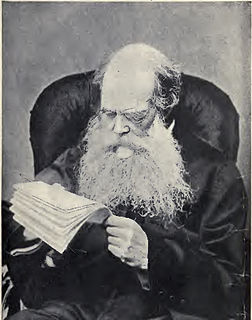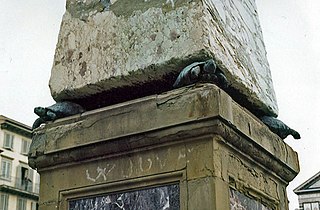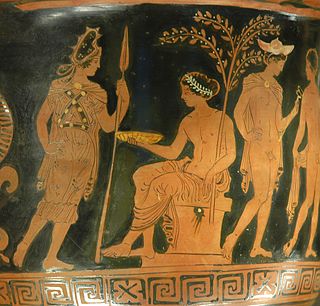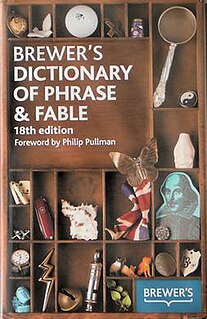The Baptes were priests of the Greek goddess Kotys. The word comes from the Greek verb βάπτω (baptō), meaning "to dip in water". The Baptes practised nocturnal ceremonies, which were associated with rampant obscenity and insobriety.
The abbreviation viz., short for the Latin videlicet, which itself is a contraction from Latin of videre licet meaning "it is permitted to see", is used as a synonym for "namely", "that is to say", "to wit", or "as follows". It is typically used to introduce examples or further details to illustrate a point. For example: "all types of data viz. text, audio, video, pictures, graphics etc. can be transmitted through networking".
The seat of government is "the building, complex of buildings or the city from which a government exercises its authority".

The Adam's apple, or laryngeal prominence, is a feature of the human neck, and is the lump or protrusion that is formed by the angle of the thyroid cartilage surrounding the larynx seen especially in males.

The Boy Who Cried Wolf is one of Aesop's Fables, numbered 210 in the Perry Index. From it is derived the English idiom "to cry wolf", defined as "to give a false alarm" in Brewer's Dictionary of Phrase and Fable and glossed by the Oxford English Dictionary as meaning to make false claims, with the result that subsequent true claims are disbelieved.
The idioms pig in a poke and sell a pup refer to a confidence trick originating in the Late Middle Ages, when meat was scarce, but cats and dogs were not. The scheme entailed the sale of a suckling pig in a poke. The bag, sold unopened, would actually contain a cat or dog, which was substantially less valuable as a source of meat. The French idiom acheter (un) chat en poche refers to an actual sale of this nature, as do many European equivalents, while the English expression refers to the appearance of the trick. This taught many scammed people the phrase "Caveat Emptor", or "buyer beware" as translated from Latin.
"Curiosity killed the cat" is a proverb used to warn of the dangers of unnecessary investigation or experimentation. The original form of the proverb, now little used, was "Care killed the cat". In this instance, "care" was defined as "worry" or "sorrow for others."

Treets are a brand of confectionery sold by Mars Limited in the United Kingdom, France, Germany and the Netherlands.
The phrase "Tom, Dick and Harry" is a placeholder for multiple unspecified people; "Tom, Dick or Harry" plays the same role for one unspecified person. The phrase most commonly occurs as "every Tom, Dick and Harry", meaning everyone, and "any Tom, Dick or Harry", meaning anyone, although Brewer's Dictionary of Phrase and Fable defines the term to specify "a set of nobodies; persons of no note".

Ebenezer Cobham Brewer, was the author of A Guide to the Scientific Knowledge of Things Familiar, Brewer's Dictionary of Phrase and Fable, and The Reader's Handbook, among other reference books.
In Swiss folklore, Jack o' the bowl is a helpful house spirit and variously described as a brownie or kobold.

Brewer's Rogues, Villains, & Eccentrics: An A-Z of Roguish Britons Through the Ages is a reference book first published by Brewer's in 2002, edited and compiled by William Donaldson.
According to the 5th century BCE Greek historian Herodotus, Orotalt was a god of Pre-Islamic Arabia whom he identified with the Greek god Dionysus:
They believe in no other gods except Dionysus and the Heavenly Aphrodite; and they say that they wear their hair as Dionysus does his, cutting it round the head and shaving the temples. They call Dionysus, Orotalt; and Aphrodite, Alilat.
That that is is that that is not is not is that it it is is an English word sequence demonstrating syntactic ambiguity. It is used as an example illustrating the importance of proper punctuation.
An abecedarian hymn is a hymn that begins with the letter A, and each verse or clause following begins with the next letter of the alphabet.

The World Turtle is a mytheme of a giant turtle supporting or containing the world. The mytheme, which is similar to that of the World Elephant and World Serpent, occurs in Hindu mythology, Chinese mythology, Scientology and the mythologies of the indigenous peoples of the Americas. The "World-Tortoise" mytheme was discussed comparatively by Edward Burnett Tylor (1878:341).
Obadiah Bull is said to have been an Irish lawyer who lived and practised in London during the reign of Henry VII. His last name is supposed to have been the origin of the term "That's a Bull", for nonsense or a blunder made by an Irishman. He was known to make absurd, half-nonsensical statements that contradicted themselves. A type of Irish joke, an "Irish bull" is styled after these.
The term first occurs in a periodical, The British Apollo, in 1740.

Kotys was a prominent Thracian goddess who was worshipped in a festival known as the Cotyttia. She was particularly worshipped among the Edones. The Greeks considered Kotys to be an aspect of Persephone.
Adrian Richard West Room was a British toponymist and onomastician, a Fellow of the Royal Geographical Society and a prolific author of reference works relating primarily to the origins of word and place-names.








